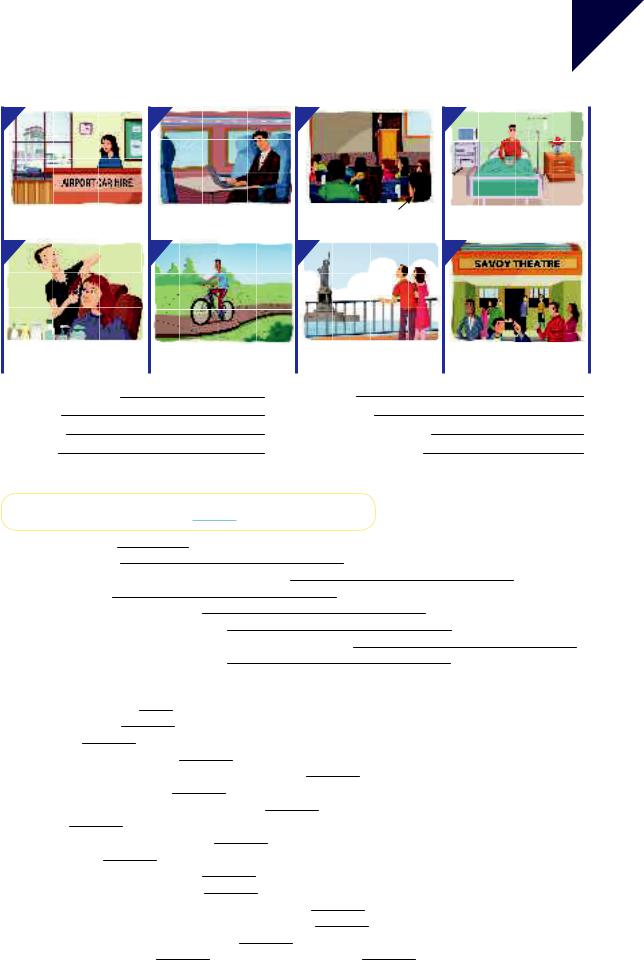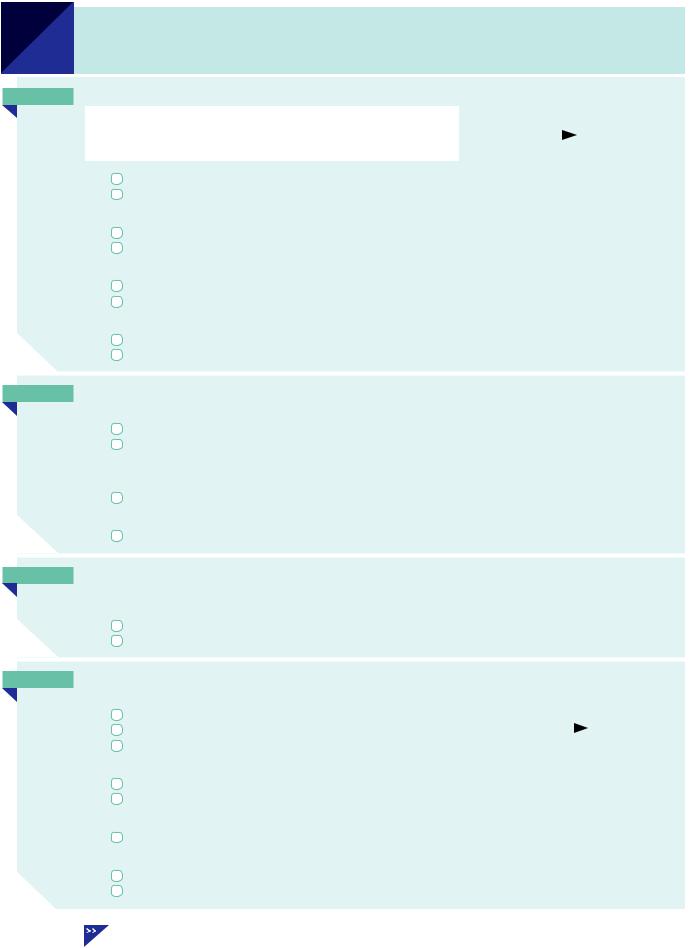
- •Contents
- •Thanks
- •To the student
- •To the teacher
- •3 Present continuous and present simple 1 (I am doing and I do)
- •10 Present perfect continuous and simple (I have been doing and I have done)
- •11 how long have you (been) … ?
- •12 for and since when … ? and how long … ?
- •13 Present perfect and past 1 (I have done and I did)
- •14 Present perfect and past 2 (I have done and I did)
- •15 Past perfect (I had done)
- •16 Past perfect continuous (I had been doing)
- •17 have and have got
- •18 used to (do)
- •19 Present tenses (I am doing / I do) for the future
- •20 I’m going to (do)
- •21 will and shall 1
- •22 will and shall 2
- •23 I will and I’m going to
- •24 will be doing and will have done
- •26 can, could and (be) able to
- •27 could (do) and could have (done)
- •28 must and can’t
- •29 may and might 1
- •30 may and might 2
- •31 have to and must
- •32 must mustn’t needn’t
- •33 should 1
- •34 should 2
- •35 I’d better … it’s time …
- •36 would
- •39 if I knew … I wish I knew …
- •40 if I had known … I wish I had known …
- •41 wish
- •42 Passive 1 (is done / was done)
- •43 Passive 2 (be done / been done / being done)
- •44 Passive 3
- •45 it is said that … he is said to … he is supposed to …
- •46 have something done
- •47 Reported speech 1 (he said that …)
- •48 Reported speech 2
- •49 Questions 1
- •52 Question tags (do you? isn’t it? etc.)
- •53 Verb + -ing (enjoy doing / stop doing etc.)
- •54 Verb + to … (decide to … / forget to … etc.)
- •55 Verb (+ object) + to … (I want you to …)
- •56 Verb + -ing or to … 1 (remember, regret etc.)
- •57 Verb + -ing or to … 2 (try, need, help)
- •58 Verb + -ing or to … 3 (like / would like etc.)
- •59 prefer and would rather
- •60 Preposition (in/for/about etc.) + -ing
- •61 be/get used to … (I’m used to …)
- •63 there’s no point in -ing, it’s worth -ing etc.
- •64 to … , for … and so that …
- •65 Adjective + to …
- •66 to … (afraid to do) and preposition + -ing (afraid of -ing)
- •67 see somebody do and see somebody doing
- •68 -ing clauses (He hurt his knee playing football.)
- •69 Countable and uncountable 1
- •70 Countable and uncountable 2
- •71 Countable nouns with a/an and some
- •74 the 2 (school / the school etc.)
- •75 the 3 (children / the children)
- •77 Names with and without the 1
- •78 Names with and without the 2
- •79 Singular and plural
- •80 Noun + noun (a bus driver / a headache)
- •81 -’s (your sister’s name) and of … (the name of the book)
- •82 myself/yourself/themselves etc.
- •83 a friend of mine my own house on my own / by myself
- •84 there … and it …
- •85 some and any
- •87 much, many, little, few, a lot, plenty
- •90 all every whole
- •91 each and every
- •92 Relative clauses 1: clauses with who/that/which
- •94 Relative clauses 3: whose/whom/where
- •95 Relative clauses 4: extra information clauses (1)
- •96 Relative clauses 5: extra information clauses (2)
- •97 -ing and -ed clauses (the woman talking to Tom, the boy injured in the accident)
- •98 Adjectives ending in -ing and -ed (boring/bored etc.)
- •99 Adjectives: a nice new house, you look tired
- •100 Adjectives and adverbs 1 (quick/quickly)
- •102 so and such
- •104 quite, pretty, rather and fairly
- •105 Comparative 1 (cheaper, more expensive etc.)
- •106 Comparative 2 (much better / any better etc.)
- •107 Comparative 3 (as … as / than)
- •108 Superlative (the longest / the most enjoyable etc.)
- •109 Word order 1: verb + object; place and time
- •110 Word order 2: adverbs with the verb
- •111 still any more yet already
- •112 even
- •114 in case
- •116 as (as I walked … / as I was … etc.)
- •117 like and as
- •119 during for while
- •121 at/on/in (time)
- •122 on time and in time at the end and in the end
- •123 in/at/on (position) 1
- •124 in/at/on (position) 2
- •125 in/at/on (position) 3
- •126 to, at, in and into
- •127 in/on/at (other uses)
- •129 Noun + preposition (reason for, cause of etc.)
- •130 Adjective + preposition 1
- •131 Adjective + preposition 2
- •132 Verb + preposition 1 to and at
- •134 Verb + preposition 3 about and of
- •135 Verb + preposition 4 of/for/from/on
- •136 Verb + preposition 5 in/into/with/to/on
- •137 Phrasal verbs 1 Introduction
- •138 Phrasal verbs 2 in/out
- •139 Phrasal verbs 3 out
- •142 Phrasal verbs 6 up/down
- •143 Phrasal verbs 7 up (1)
- •144 Phrasal verbs 8 up (2)
- •145 Phrasal verbs 9 away/back
- •Additional exercises
- •Study guide
- •Key to Exercises
- •Key to Additional exercises (see page 302)
- •Key to Study guide
- •Index

Unit
125 in/at/on (position) 3
Ain hospital / at work etc.
We say that somebody is in bed / in hospital / in prison:
James isn’t up yet. He’s still in bed.
Anna’s mother is in hospital.
We say that somebody is at home / at work / at school / at university / at college:
I’ll be at work until 5.30.
My sister is at university. My brother is still at school.
We say be at home or be home (with or without at), but do something at home (with at):
I’ll be home all evening. or I’ll be at home all evening. Shall we go to a restaurant or eat at home?
Bat a party / at a concert etc.
We say that somebody is at an event (at a party, at a conference etc.):
Were there many people at the party / at the meeting / at the wedding? I saw Steve at a conference / at a concert on Saturday.
Cin and at for buildings
You can oten use in or at with buildings. For example, you can eat in a restaurant or at a restaurant; you can buy food in a supermarket or at a supermarket.
We usually say at when we say where an event takes place (a concert, a party, a meeting etc.):
We went to a concert at the National Concert Hall.
The meeting took place at the company’s head ofice in Frankfurt. There was a robbery at the supermarket.
We say at somebody’s house:
I was at Helen’s house last night. or I was at Helen’s last night.
In the same way we say at the doctor’s, at the hairdresser’s etc.
We use in when we are thinking about the building itself. Compare at and in:
I was at Helen’s (house) last night.
It’s always cold in Helen’s house. The heating doesn’t work well. (not at Helen’s house) We had dinner at the hotel.
All the rooms in the hotel have air conditioning. (not at the hotel)
We say at the station / at the airport:
There’s no need to meet me at the station. I can get a taxi.
Din and at for towns etc.
We normally use in with cities, towns and villages:
The Louvre is a famous art museum in Paris. (not at Paris)
Sam’s parents live in a village in the south of France. (not at a village)
We use at when we think of the place as a point or station on a journey:
Does this train stop at Oxford? (= at Oxford station)
Eon a bus / in a car etc.
We usually say on a bus / on a train / on a plane / on a ship but in a car / in a taxi:
The bus was very full. There were too many people on it.
Laura arrived in a taxi.
We say on a bike (= bicycle) / on a motorbike / on a horse: Jane passed me on her bike.
|
at school / in hospital etc. Unit 74 in/at/on (position) Units 123–124 to/at/in/into Unit 126 |
250 |
by car / by bike etc. Unit 128B |

Exercises |
|
|
|
|
Unit |
|||
|
|
|
|
125 |
||||
|
|
|
|
|
||||
|
Complete the sentences about the pictures. Use in, at or on with the words below the pictures. |
|||||||
125.1 |
|
|||||||
|
|
|
|
|
|
|
||
1 |
2 |
3 |
4 |
MARTIN |
||||
|
|
DAVE |
KAREN |
|
(the airport) |
(a train) |
|
(a conference) |
(hospital) |
|
|
|
|
|
5 |
6 |
GARY |
7 |
8 |
|
JUDY |
|
|
|
|
|
(the hairdresser’s) |
(his bike) |
|
(New York) |
(the Savoy Theatre) |
||
|
|
|
|
|
|
|
1 |
You can hire a car |
at the airport |
. |
5 |
Judy is |
. |
2 |
Dave is |
|
. |
6 |
I saw Gary |
. |
3 |
Karen is |
|
. |
7 |
We spent a few days |
. |
4 |
Martin |
|
. |
8 |
We went to a show |
. |
125.2 |
Complete the sentences. Use in, at or on + the following: |
|
|||||||
|
|
the plane |
the station |
|
a taxi |
the art gallery |
|
||
|
|
Tokyo |
school |
|
|
prison |
the sports centre |
||
1 |
Some people are in |
prison |
for crimes that they did not commit. |
||||||
2 |
We can get cof ee |
|
|
|
|
while we’re waiting for our train. |
|||
3 |
We walked to the restaurant, but we went home |
|
. |
||||||
4 |
I play basketball |
|
|
|
|
on Friday evenings. |
|||
5 |
I enjoyed the flight, but the food |
|
|
was awful. |
|||||
6 |
Vicky has gone to Japan. She’s living |
|
|
. |
|||||
7 |
‘Does your sister have a job?’ |
‘No, she’s only 16. She’s still |
.’ |
||||||
8 |
There’s a new exhibition of paintings |
|
|
. Let’s go and see it. |
|||||
|
|
|
|||||||
125.3 |
Complete these sentences with in, at or on. |
|
|
||||||
1 |
We went to a concert |
at the National Concert Hall. |
|
|
|||||
2 |
There isn’t a shop |
|
the village where I live. It’s very small. |
||||||
3 |
Joe wasn’t |
|
the party. I don’t know why he didn’t go. |
||||||
4 |
There were about ten tables |
|
|
the restaurant, and four tables outside. |
|||||
5 |
I don’t know where my umbrella is. Perhaps I let it |
|
the bus. |
||||||
6 |
What do you want to study |
|
university? |
|
|
||||
7 |
I didn’t feel well when I woke up, so I stayed |
bed. |
|
||||||
8 |
We were |
Sarah’s house last night. She invited us to dinner. |
|||||||
9 |
It was a very slow train. It stopped |
every station. |
|
||||||
10 |
Shall we travel |
|
your car or mine? |
|
|
||||
11 |
We took a taxi and Ben followed |
his motorbike. |
|
||||||
12 |
I’d like to see a movie. What’s on |
the cinema this week? |
|||||||
13 |
We went to see a movie last night. It was really cold |
|
the cinema. |
||||||
14 |
Two people were injured in the accident and are still |
|
hospital. |
||||||
15 |
Our flight was delayed. We had to wait |
the airport for three hours. |
|||||||
16 |
I didn’t expect you to be |
|
home. I thought you’d be |
work. |
|||||
Additional exercise 34 (page 322) |
251 |

Unit
126 to, at, in and into
AWe say go/come/travel (etc.) to a place or event. For example:
go to China |
go to work |
come to my house |
TO |
|
||
|
||||||
go back to Italy |
go to the bank |
drive to the airport |
|
|||
|
|
|
|
|||
|
|
|
|
|||
return to London |
go to a party |
be taken to hospital |
|
|
|
|
|
|
|
|
|||
|
|
|
|
|
|
|
When are your friends going back to Italy? (not going back in Italy)
Three people were injured in the accident and taken to hospital.
In the same way we say Welcome to … , a trip to … , a visit to … , on my way to … etc. :
Welcome to our country! (not Welcome in) We had to cancel our trip to Paris.
Compare to (for movement) and in/at (for position):
They are going to France. |
but |
They live in France. |
Can you come to the party? |
but |
I’ll see you at the party. |
We say ‘(I’ve) been to’ a place or an event:
I’ve been to Italy four times, but I’ve never been to Rome.
Amanda has never been to a football match in her life.
Bget and arrive
We say get to a place:
They got to the hotel at midnight.
What time did you get to the party?
We say arrive in … or arrive at … (not arrive to).
We say arrive in a town or country:
They arrived in Madrid / in Spain a week ago.
For other places (buildings etc.) or events, we say arrive at:
What time did you arrive at the hotel / at the airport / at the party?
Chome
We say: go home, come home, get home, arrive home, on the way home etc. (no preposition). We do not say ‘to home’:
What time did you get home? (not get to home) I met Lisa on my way home.
Dinto
go into, get into … etc. = enter (a room / a building / a car etc.): |
|
|
|
I opened the door, went into the room and sat down. |
INTO |
|
|
|
|
||
A bird flew into the kitchen through the window. |
|
|
|
|
|
|
|
Every month my salary is paid directly into my bank account. |
|
|
|
With some verbs (especially go/get/put) we oten use in (instead of into): |
|
|
|
She got in the car and drove away. or She got into the car … |
|
|
|
I read the letter and put it back in the envelope. |
|
|
|
The opposite of into is out of: |
|
|
|
She got out of the car and went into a shop. |
|
|
|
For buses, trains and planes, we usually say get on and get of: |
|
|
|
She got on the bus and I never saw her again. |
|
|
|
You need to get of (the train) at the next station. |
|
|
|
|
been to Units 7–8 in/at/on (position) Units 123–125 at home Unit 125A |
252 |
into and in Unit 138A |

Exercises |
Unit |
126 |
|
|
|
126.1 Put in to/at/in/into where necessary. If no preposition is necessary, leave the space empty.
1 |
Three people were taken to |
hospital ater the accident. |
|
|||
2 |
I’m tired. Let’s go |
– home now. (no preposition) |
|
|
||
3 |
We let our luggage |
|
the station and went to find something to eat. |
|
||
4 |
Shall we take a taxi |
|
the station or shall we walk? |
|
||
5 |
I have to go |
the bank today. What time does it open? |
|
|||
6 |
The Amazon flows |
|
the Atlantic Ocean. |
|
|
|
7 |
I missed the bus, so I walked |
|
home. |
|
|
|
8 |
Have you ever been |
|
Canada? |
|
|
|
9 |
I lost my key, but I managed to climb |
the house through a window. |
|
|||
10 |
We got stuck in a trafic jam on our way |
the airport. |
|
|||
11 |
We had lunch |
the airport while we were waiting for our plane. |
|
|||
12 |
It took us four hours to get |
the top of the mountain. |
|
|||
13 |
Welcome |
the hotel. We hope you enjoy your stay here. |
|
|||
14 |
We drove along the main road and then turned |
a narrow side street. |
|
|||
15 |
Did you enjoy your visit |
the zoo? |
|
|
||
16 |
I did some shopping on my way |
home. |
|
|
||
17 |
Marcel is French. He has just returned |
France ater two years |
Brazil. |
|||
18 |
Carl was born |
Chicago, but his family moved |
Boston when he was three. |
|||
126.2Write sentences about places you have been to. Use I’ve been to / I’ve never been to + the words in brackets.
1 (never) I’ve never been to Egypt.
2 (once)
3 (never)
4 (a few times)
5 (many times)
126.3Put in to/at/in where necessary. If no preposition is necessary, leave the space empty.
1 |
What time does this train get to London? |
|||
2 |
They arrived |
Barcelona a few days ago. |
||
3 |
What time did you get |
|
home last night? |
|
4 |
What time do you usually arrive |
work in the morning? |
||
5 |
When we got |
the cinema, there was a long queue outside. |
||
6 |
We were delayed and arrived |
home very late. |
||
|
||||
126.4 |
Write sentences using got + into / out of / on / o . |
|||
1 |
You were walking home. A friend passed you in her car. She saw you, stopped and ofered you a lit. |
|||
|
|
She opened the door. What did you do? I got into the car. |
||
2 |
You were waiting at the bus stop. At last your bus came and stopped. The doors opened. |
|||
|
|
What did you do then? I |
the bus. |
|
3You drove home in your car. You stopped outside your house and parked the car. What did you do then?
4 You were travelling by train to Manchester. When the train got to Manchester, what did you do?
5You needed a taxi. Ater a few minutes a taxi stopped for you. You opened the door. What did you do then?
6You were travelling by plane. At the end of your flight, your plane landed at the airport and stopped. The doors were opened, you took your bag and stood up.
What did you do then?
Additional exercise 34 (page 322) |
253 |
